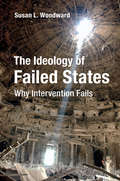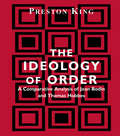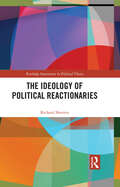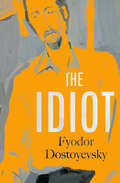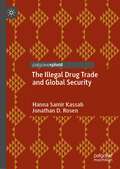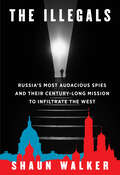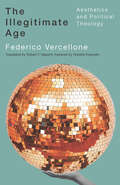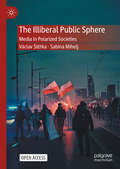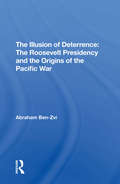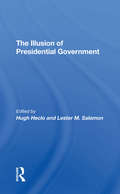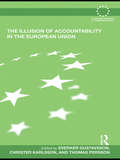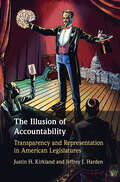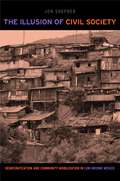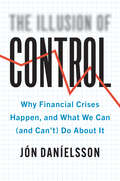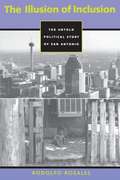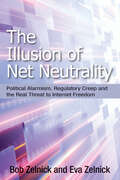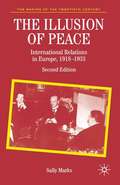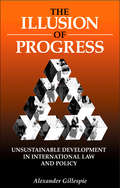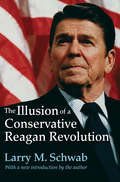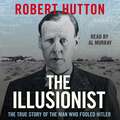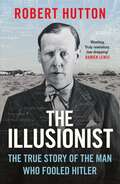- Table View
- List View
The Ideology of Failed States
by Woodward Susan L.What do we mean when we use the term 'failed states'? This book presents the origins of the term, how it shaped the conceptual framework for international development and security in the post-Cold War era, and why. The book also questions how specific international interventions on both aid and security fronts - greatly varied by actor - based on these outsiders' perceptions of state failure create conditions that fit their characterizations of failed states. Susan L. Woodward offers details of international interventions in peacebuilding, statebuilding, development assistance, and armed conflict by all these specific actors. The book analyzes the failure to re-order the international system after 1991 that the conceptual debate in the early 1990s sought - to the serious detriment of the countries labelled failed or fragile and the concept's packaging of the entire 'third world', despite its growing diversity since the mid-1980s, as one.
The Ideology of Order: A Comparative Analysis of Jean Bodin and Thomas Hobbes
by Preston KingA school of thought traceable to the political writings of Bodin and Hobbes believes that "order" is the cardinal principle which takes precedence over "justice" - which is reduced to conformity. The main concern of this book is to analyse this tradition through study of its progenitors.
The Ideology of Political Reactionaries (Routledge Innovations in Political Theory)
by Richard ShortenThe Ideology of Political Reactionaries offers a new perspective on the beliefs reactionaries share, presenting a theory of reactionary ideology in the process. Rather than taking self-contradictions in the reactionary imagination as a reason for diminishment, complexity is taken as a challenge. The book argues that the features that unite reactionaries lie in rhetoric. Reactionaries make three persuasive appeals: to decadence, conspiracy, and indignation. They also display some recurrent styles. The book’s rhetorical approach entails a critique of the alternative approaches to reactionary politics (dubbed as ‘dispositional’, ‘sociological’, and ‘conceptual’). At the heart of the book is the textual analysis of the writings of a range of figures who are chosen in deliberate diversity and who have interacted with political audiences in different eras and settings: Edmund Burke, Joseph de Maistre, Sarah Palin, Donald Trump, Adolf Hitler, Éric Zemmour, Joe McCarthy, Anders Breivik, and Nigel Farage. Analysis of their writings helps the book to reckon with some particular puzzles of ideologies and rhetoric. These puzzles include the proximity of reactionaries to conservatism, the ambiguity of their nostalgia, the myth of their essential charisma, and the apparent fetishization of facts. The Ideology of Political Reactionaries ought to interest anyone concerned about current ideological trends and, in particular, students and scholars of politics and history.
The Ideology of Tyranny
by Guido Giacomo PreparataThe contemporary jargon of political correctness and the so-called "politics of diversity" so prevalent in the academic and administrative discourse of the United States can be traced to the fantastic sociology of an obscure French pornographer, Georges Bataille (1897-1962). The celebration of violence sung in his works, re-elaborated in abstract form by the late followers of Bataille, has led to the creation of a peculiar talk emphasizing difference, antagonism, intellectual despair, and a profound political conservatism. This bookascribes the late state of paralysis affecting dissent in America to the adoption of a peculiar gospel of divisiveness, which was promoted in the Eighties by importing from France the "theories" of philosopher Michel Foucault. "
The Idiot: Webster's Chinese Simplified Thesaurus Edition
by Fyodor Dostoyevsky Eva MartinA novel of innocence and iniquity, love and murder, by the nineteenth-century Russian author of Crime and Punishment and The Brothers Karamazov. After several years in a Swiss sanatorium, twenty-six-year-old Prince Myshkin returns to Russian society to collect his rightful inheritance. But he soon crosses paths with the dark Rogozhin, a rich merchant&’s son whose desire for Nastasya Filippovna will set the three of them on a tragic course. As author Fyodor Dostoevsky traces the effect of Myshkin&’s innocence on the people around him in St. Petersburg, scandal escalates to murder . . . &“I think The Idiot to be a masterpiece—flawed, occasionally tedious or overwrought, like many masterpieces—but a fact of world literature just as important as the densely dramatic Brothers Karamazov or the brilliantly subtle and terrifying Devils. In those two novels, as in the simpler Crime and Punishment, Dostoevsky had plots and political and religious ideas working together. In The Idiot he is straining to grasp a story and a character converting themselves from Gothic to Saint&’s Life on the run. What makes the greatness is double—the character of the prince, and a powerful series of confrontations with death. The true subject of The Idiot is the imminence and immanence of death.&” —A. S. Byatt, The Guardian &“Nothing is outside Dostoevsky&’s province. . . . Out of Shakespeare there is no more exciting reading.&” —Virginia Woolf
The Idler's Glossary
by Seth Joshua Glenn Mark KingwellFor as long as mankind has had to work for a living, people who work have disparaged those who prefer not to. This glossary playfully explores the etymology and history of hundreds of idler-specific terms and phrases, while offering a foundation for a new mode of thinking about work and labor.
The Illegal Drug Trade and Global Security
by Jonathan D. Rosen Hanna Samir KassabThis book explores global drug trafficking networks’ impact on international security and provides an in-depth analysis of drug trafficking networks globally by integrating international relations and security studies theories. The book acts as a primer, simplifying the complicated world of narcotics and insecurity, while also providing policy recommendations for policy-makers hoping to reduce the power of organized criminal and terrorist networks globally. It will be of interest to undergraduate and postgraduates taking courses in International Relations, Global Politics, Defense Studies, Security Studies, and International Political Economy, as well as Criminal Justice, Sociology, and other social science disciplines that cover issues related to drug trafficking, organized crime, and violence.
The Illegals: Russia's Most Audacious Spies and Their Century-Long Mission to Infiltrate the West
by Shaun WalkerThe definitive history of Russia&’s most secret spy program, from the earliest days of the Soviet Union to Putin&’s invasion of Ukraine, and a revelatory examination of how that hidden history shaped both Russia and the West.More than a century ago, the new Bolshevik government began sending Soviet citizens abroad as deep-cover spies, training them to pose as foreign aristocrats, merchants, and students. Over time, this grew into the most ambitious espionage program in history. Many intelligence agencies use undercover operatives, but the KGB was the only one to go to such lengths, spending years training its spies in language and etiquette, and sending them abroad on missions that could last for decades. These spies were known as &“illegals.&” During the Second World War, illegals were dispatched behind enemy lines to assassinate high-ranking Nazis. Later, in the Cold War, they were sent to assimilate and lie low as sleepers in the West. The greatest among them performed remarkable feats, while many others failed in their missions or cracked under the strain of living a double life.Drawing on hundreds of hours of interviews, as well as archival research in more than a dozen countries, Shaun Walker brings this history to life in a page-turning tour de force that takes us into the heart of the KGB&’s most secretive program. A riveting spy drama peopled with richly drawn characters, The Illegals also uncovers a hidden thread in the story of Russia itself. As Putin extols Soviet achievements and the KGB&’s espionage prowess, and Moscow continues to infiltrate illegals across the globe, this timely narrative shines new light on the long arc of the Soviet experiment, its messy aftermath, and its influence on our world at large.
The Illegals: Russia's Most Audacious Spies and the Plot to Infiltrate the West
by Shaun Walker'A brilliant historical investigation that's as gripping as a Le Carré novel' Tom Burgis'Shaun Walker skilfully shows how Russia's modern-day election meddling is rooted in the subterfuge and trickery of the bad old days. This is a fascinating read.' Oliver Bullough'A gripping history critical to understanding many of Russia's influence operations today.' Catherine Belton'Sinister, clandestine and deadly - this is essential history, and it is happening now.' Simon Sebag Montefiore'A riveting spy thriller, which doubles as a secret history of Russia.' Peter PomerantsevIn 2010, two decades after the Cold War had ended, ten Russian spies were arrested in America, having hidden their true identities from their friends, neighbours and even their children. They were part of a spy programme that had begun nearly a century earlier, when the revolutionary Bolshevik government began sending Soviet citizens abroad to pose as foreign aristocrats, merchants and students. These deep-cover missions - some remarkable feats of espionage, others high-profile failures - could last for decades.Drawing on hundreds of hours of interviews, as well as newly discovered archival material, Shaun Walker brings this history to life in a page-turning tour de force that goes to the heart of what became the most ambitious espionage programme in history. As Moscow continues to infiltrate illegals across the globe, The Illegals shines new light on the long arc of the Soviet experiment and its messy aftermath - and on how that hidden history shaped Russia and the West.
The Illegitimate Age: Aesthetics and Political Theology (Outspoken)
by Federico VercelloneOur age – saturated with media images and ever-present political crises – traces back to the beginning of Christianity and its messianic vision of the world. In the twentieth and twenty-first centuries, our sense of time and history has become apocalyptic.In The Illegitimate Age Federico Vercellone explains contemporary affinities for both apocalypse and media imagery from the perspective of political theology, drawing from St Paul’s mysterious figure of the katechon – the withholding power that prevents the arrival of the Antichrist and the end of times while also delaying the Messiah, therefore containing the very evil it restrains. Vercellone highlights representation as a crucial aspect of the katechon myth, finding within it the roots of current political and aesthetic forms. In the context of contemporary populism, charismatic leaders build their power on presumed prestige, mimicry of sacred figures, and pandering invocations of kitsch, all recurrent aspects of the katechon and Antichrist trope in Western art and history. Political power, Vercellone argues, has been deeply aestheticized, and the path that led us here was laid long before mass media, mass consumption, and our society of the spectacle.A new interpretation of the political and aesthetic categories first suggested by Carl Schmitt, Walter Benjamin, and Jean Baudrillard, The Illegitimate Age turns a fresh lens on the legitimacy of political power, the appeal of populism, and the role of the image in our society.
The Illiberal Public Sphere: Media in Polarized Societies
by Sabina Mihelj Václav ŠtětkaThis open access book provides the first systematic analysis of the role of the media in the rise of illiberalism, based on an original theoretical framework and extensive empirical research in Eastern Europe – a region that serves as a key battleground in the global advance of illiberalism. Liberal democracies across the world are facing a range of challenges, from the growing influence of illiberal leaders and parties to deepening polarization and declining trust in political elites and mainstream media. Although these developments attracted significant scholarly attention, the factors that contribute to the spreading of illiberalism remain poorly understood, and the communication perspective on illiberalism is particularly underdeveloped.Štětka and Mihelj address this gap by introducing the concept of the illiberal public sphere, identifying the key stages in its development, and explaining what makes illiberalism distinct from related phenomena such as populism. Their analysis reveals how and why the changing communication environment facilitates selective exposure to ideologically and politically homogeneous sources, fosters changes in normative assumptions that guide media trust, increases vulnerability to disinformation, and goes hand in hand with growing hostility to immigration and LGBTQ+ rights. The findings challenge widespread assumptions about digital platforms as key channels of illiberalism and suggest that their role shifts as the illiberal sphere progresses.The arguments presented in this book have important implications for future research on challenges to liberal democracy, as well as for journalists, media regulators and other professionals committed to rebuilding media trust and containing the forces of polarization.
The Illusion Of Deterrence: The Roosevelt Presidency And The Origins Of The Pacific War
by Abraham Ben-zviThe aim of this book is to specifically, expose the conceptual origins of the American failure to deter Japan, to a higher level of understanding regarding the general limits of deterrence and of coercive diplomacy will be achieved. It is similarly hoped that by underscoring the role which certain basic cognitive (and bureaucratic) processes played
The Illusion Of Presidential Government
by Hugh Heclo Lester M Salamon"Presidential government is an illusion. It is an image that misleads presidents no less than the media and the American public." Thus begins this realistic look at the presidency, in which nine leading presidential scholars examine how and why we are under the illusion of presidential government and ask such questions as: What is the president's actual role? What has happened to his traditional tools of executive leadership? How is the office of the president organized to deal with domestic, economic, and national security affairs? is federal regulation an area of potential power for the president? And, if "presidential government" is indeed a myth, what can be done to help the presidency play a more effective part in constitutional government? Each chapter probes a different facet of the image of presidential government by looking at the major operations of the modern presidency-from struggles with Congress for control of administrative detail to problems of managing the economy and national security. The book closes with the final report of the National Academy of Public Administration's Panel on Presidential Management. Not surprisingly, the authors do not always agree; nevertheless, they are united in the view that the managerial role of the president must be seen as a whole-and without illusions.
The Illusion of Accountability in the European Union (Routledge Advances in European Politics)
by Sverker Gustavsson Thomas Persson Christer KarlssonThis book examines accountability in the EU from different perspectives and considers whether EU citizens have real opportunities for holding decision-makers accountable. This book critically analyses five arguments which claim there are sufficient means for holding decision-makers to account in the Union. The main conclusion is that the current institutional set-up and practice of decision-making in the EU is one that merely creates an illusion of accountability. Using a strict framework focusing on the difference between formal mechanisms and actual opportunities for accountability, this highly coherent volume will be of interest to students and scholars of European politics, especially those interested in the democratic foundations of the European political system. Chapter 1 of this book is freely available as a downloadable Open Access PDF under a Creative Commons Attribution-Non Commercial-No Derivatives 3.0 license. https://s3-us-west-2.amazonaws.com/tandfbis/rt-files/docs/Open+Access+Chapters/9780415480994_oachapter1.pdf
The Illusion of Accountability: Transparency and Representation in American Legislatures
by Jeffrey J. Harden Justin H. KirklandDoes open governance strengthen democracy? The Illusion of Accountability contends that it does not. Leveraging a wealth of data from decades of legislative politics in the American states, the book assesses the causes and consequences of 'open meetings laws,' which require public access to proceedings in state legislatures. The work traces the roots of these laws back to the founding constitutions of some states and analyzes the waves of adoptions and exemptions to open meetings that occurred in the twentieth century. The book then examines the effects of these transparency laws on a host of politically consequential outcomes both inside and outside the legislature. This analysis consistently finds that open meetings do not influence legislators' behavior or citizens' capacity to alter that behavior. Instead, a link between transparent legislatures and an expanded system of organized interests is established. This illuminating work concludes that transparency reform only creates the illusion of accountability in state government.
The Illusion of Civil Society: Democratization and Community Mobilization in Low-Income Mexico
by Jon ShefnerMuch has been written about how civil society challenges authoritarian governments and helps lead the way to democratization. These studies show that neoliberal economic policies have harmed many sectors of society, weakening the state and undermining clientelistic relationships that previously provided material benefits to middle- and low-income citizens, who are then motivated to organize coalitions to work for greater social justice and equality. Recognizing this important role played by civil society organizations, Jon Shefner goes further and analyzes the variegated nature of the interests represented in these coalitions, arguing that the differences among civil society actors are at least as important as their similarities in explaining how they function and what success, or lack thereof, they have experienced. Through an ethnographic examination extending over a decade, Shefner tells the story of how a poor community on the urban fringe of Guadalajara mobilized through an organization called the Unión de Colonos Independientes (UCI) to work for economic improvement with the support of Jesuits inspired by liberation theology. Yet Mexico’s successful formal democratic transition, won with the elections in 2000, was followed by the dissolution of the coalition. Neither political access for the urban poor, nor their material well-being, has increased with democratization. The unity and even the concept of civil society has thus turned out to be an illusion.
The Illusion of Control: Why Financial Crises Happen, and What We Can (and Can’t) Do About It
by Jon DanielssonA challenge to the conventional wisdom surrounding financial risk, providing insight into why easy solutions to control the financial system are doomed to fail Finance plays a key role in the prosperity of the modern world—but it also brings grave dangers. We seek to manage those threats with a vast array of sophisticated mathematical tools and techniques of financial risk management. Too often, though, we fail to address the greatest risk—the peril posed by our own behavior. Jón Daníelsson argues that critical risk is generated from within, through the interactions of individuals and perpetuated by their beliefs, objectives, abilities, and prejudices. He asserts that the widespread belief that risk originates outside the financial system frustrates our ability to measure and manage it, and the likely consequences of new regulations will help alleviate small-scale risks but, perversely, encourage excessive risk taking. Daníelsson uses lessons from past and recent crises to show that diversity is the best way to safeguard our financial system.
The Illusion of Inclusion: The Untold Political Story of San Antonio
by Rodolfo RosalesTo many observers, the 1981 election of Henry Cisneros as mayor of San Antonio, Texas, represented the culminating victory in the Chicano community's decades-long struggle for inclusion in the city's political life. Yet, nearly twenty years later, inclusion is still largely an illusion for many working-class and poor Chicanas and Chicanos, since business interests continue to set the city's political and economic priorities.<P><P>In this book, Rodolfo Rosales offers the first in-depth history of the Chicano community's struggle for inclusion in the political life of San Antonio during the years 1951 to 1991, drawn from interviews with key participants as well as archival research. He focuses on the political and organizational activities of the Chicano middle class in the context of post-World War II municipal reform and how it led ultimately to independent political representation for the Chicano community. Of special interest is his extended discussion of the role of Chicana middle-class women as they gained greater political visibility in the 1980s.
The Illusion of Net Neutrality: Political Alarmism, Regulatory Creep and the Real Threat to Internet Freedom
by Bob Zelnick Eva ZelnickIn this riveting treatise, coauthors Bob Zelnick and Eva Zelnick sound the alarm on the debilitating effect that looming regulations, rules, and powerful interests would have on today's regulation-free Internet. The authors lay out the imminent threats—from “network neutrality” to FCC regulations—that would rob this global, society-changing, communication powerhouse forever of its full potential.
The Illusion of Peace: International Relations in Europe, 1918–1933 (Making Of The Twentieth Century Ser.)
by Sally MarksSally Marks provides a compelling analysis of European diplomacy between the First World War and Hitler's advent. She explores in clear and lively prose the reasons why successive efforts failed to create a lasting peace in the interwar era. Building on the theories of the first edition - many of which have become widely accepted since its publication in 1976 - Marks reassesses Europe's leaders of the period, and the policies of the powers between 1918 and 1933, and beyond. Strongly interpretative and archivally based, The Illusion of Peace examines the emotional, ethnic, and economic factors responsible for international instability, as well as the distortion of the balance of power, the abnormal position of the Soviet Union, the weakness of France and the uncertainty of her relationship with Britain, and the inadequacy of the League of Nations. In so doing, the study clarifies the complex topics of reparations and war debts and challenges traditional assumptions, concluding that widespread western devotion to disarmament and dedication to peace were two of several reasons why democratic statesmen could not respond decisively to Hitler's threat. In this new edition Marks also argues that the Allied failure to bring defeat home to the German people in 1918-19 generated a resentment which contributed to interwar instability and Hitler's rise. This highly successful study has been thoroughly revised and updated to reflect the latest scholarship. Now in its second edition, it remains the essential introduction to the tense political and diplomatic situation in Europe during the interwar years.
The Illusion of Progress: Unsustainable Development in International Law and Policy
by Alexander GillespieIs 'sustainable development' a charade sold to an increasingly misled public? This book presents a wide-ranging, penetrating critique of sustainability and what it actually means. The author argues that despite the rhetoric of socially and environmentally sustainable development and the ever-increasing number of legislative environmental policies, the real issues such as consumption, population growth and equity are either sidestepped or manipulated in international policy and law. Analyzing the main areas of concern - economic growth, market structure, trade, aid, debt, security and sovereignty - he shows that the entire development structure and the underpinnings of the debate are leading down quite a different path to that intended by sustainability.
The Illusion of Well-Being: Economic Policymaking Based on Respect and Responsiveness
by Mark D. WhiteThe use of measures of economic output to guide policymaking has been criticized for decades because of their weak ties to human well-being. Recently, many scholars and politicians have called for measures of happiness or subjective well-being to be used to guide policy in people's true interests. In The Illusion of Well-Being, Mark D. White explains why using happiness as a tool for policymaking is misguided and unethical. Happiness is too vague a term to define, and too general a concept, to measure in a way that captures people's true feelings. He extends this critique to well-being in general and concludes that no measure of well-being can do justice to people's true interests, which are complex, multifaceted, and subjective. White suggests instead that policymaking be conducted according to respect and responsiveness, promoting the true interests of citizens while addressing their real needs, and devoting government resources to where they can do the most good.
The Illusion of a Conservative Reagan Revolution
by Larry M. SchwabThis book presents a provocative perspective on the impact of the Reagan administration. Many political commentators, both liberal and conservative, argue that the 1980s was a period of fundamental conservative change. Some of them believe the changes have been so important that the 1980s should be seen as a watershed period in American political history as significant as the 1930s. Schwab denies this thesis and points out that politics and policy did not fundamentally change in a conservative direction. Instead, he demonstrates how policy developments and the political system actually moved in the opposite direction.In the realm of public opinion, Schwab points out that sentiment tends to shift toward the left rather than the right. Support for social and environmental programs remained high and even increased during the Reagan era, whereas support for defense programs dropped to a near-record low. Instead of a New Right conservative shift in public opinion on social issues, Americans became more liberal on women's rights, minority rights, and sexual behavior issues.Schwab's critique extends as well to Reagan's political success and popularity. Rather than being one of the most successful presidents in leading Congress, he was one of the least successful. His conservative ideology lessened support for him among many voters and congressional liberals gained more voter support during the 1980s' elections than conservatives.
The Illusionist: The True Story of the Man Who Fooled Hitler
by Robert HuttonCairo, 1942: If you had asked a British officer who Colonel Clarke was, they would have been able to point him out: always ready with a drink and a story, he was a well-known figure in the local bars. If you then asked what he did, you would have less success. Those who knew didn't tell, and almost no one really knew at all.Clarke thought of himself as developing a new kind of weapon. Its components? Rumour, stagecraft, a sense of fun. Its target? The mind of Erwin Rommel, Hitler's greatest general. Throughout history, military commanders have sought to mislead their opponents. Dudley Clarke set out to do it on a scale no one had imagined before. Even afterwards, almost no one understood the magnitude of his achievement. Drawing on recently released documents and hugely expanding on the louche portrait of Clarke as seen in SAS: Rogue Heroes, journalist and historian Robert Hutton reveals the amazing story of Clarke's A Force, the invention of the SAS and the Commandos, and the masterful hoodwinking of the Desert Fox at the battle of El Alamein. The Illusionist tells for the first time the dazzling tale of how, at a pivotal moment in the war, British eccentricity and imagination combined to thwart the Nazis and save innumerable lives - on both sides.
The Illusionist: The True Story of the Man Who Fooled Hitler
by Robert HuttonCairo, 1942: If you had asked a British officer who Colonel Clarke was, they would have been able to point him out: always ready with a drink and a story, he was a well-known figure in the local bars. If you then asked what he did, you would have less success. Those who knew didn't tell, and almost no one really knew at all.Clarke thought of himself as developing a new kind of weapon. Its components? Rumour, stagecraft, a sense of fun. Its target? The mind of Erwin Rommel, Hitler's greatest general. Throughout history, military commanders have sought to mislead their opponents. Dudley Clarke set out to do it on a scale no one had imagined before. Even afterwards, almost no one understood the magnitude of his achievement. Drawing on recently released documents and hugely expanding on the louche portrait of Clarke as seen in SAS: Rogue Heroes, journalist and historian Robert Hutton reveals the amazing story of Clarke's A Force, the invention of the SAS and the Commandos, and the masterful hoodwinking of the Desert Fox at the battle of El Alamein. The Illusionist tells for the first time the dazzling tale of how, at a pivotal moment in the war, British eccentricity and imagination combined to thwart the Nazis and save innumerable lives - on both sides.
